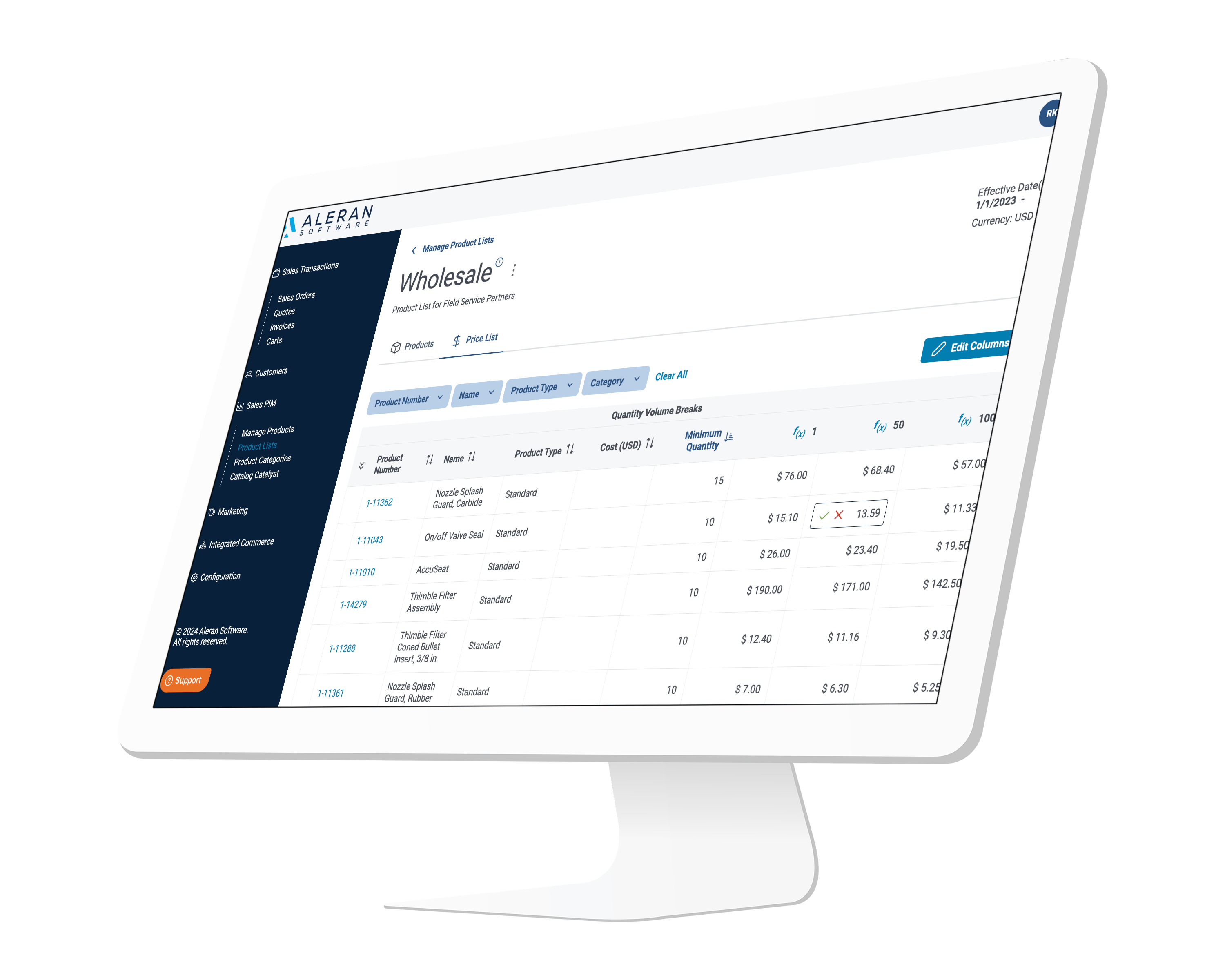With 2020 yielding the highest digital commerce growth in the last twenty years there’s no arguing that online shopping has become an integral part of modern life. New and emerging technologies continue to transform the sales landscape and consumer behaviors are adapting accordingly. From personalization to self-service, consumers expect intuitive and consistent shopping experiences wherever (and however) they shop. For sellers looking to survive and thrive in today’s crowded and competitive sales landscape, keeping pace with customers’ rising expectations is mission critical.
Omnichannel commerce has emerged as an approach to B2B selling that guarantees customers a smooth and experience no matter what channel they happen to be shopping on — mobile, desktop, social or brick-and-mortar.
Let’s take a closer look at what omnichannel commerce is (and why you need it).
What is omnichannel commerce?
Omnichannel commerce means unifying your brand’s sales presence across numerous selling channels or platforms (i.e. mobile websites and apps, messaging and SMS, desktop, catalog, email, e-commerce marketplaces, brick-and-mortar, etc.) and allowing customers to interact and shop on those channels seamlessly. For example, a customer might research a product using their desktop, make a purchase on mobile, and then select curbside pick up during checkout.
What are omnichannel commerce solutions?
Ideally, omnichannel commerce solutions provide the tools and tech required to run multiple sales channels simultaneously while minimizing back-end efforts. Omnichannel solutions are most effective when they integrate online and offline channels so that they speak to one another. This can include everything from data sharing to inventory management to shipping and logistics.
What are some of the benefits of omnichannel commerce solutions?
Modern omnichannel commerce solutions help sellers deliver on the promise of seamless, buying experiences for today’s demanding customer. In contrast to multichannel commerce, omnichannel takes place across multiple channels but goes a step further, connecting those channels for a shopping experience wherever you are. Using customer data and analytics from multiple channels, omnichannel commerce connects the dots for sellers — giving them the power to create better, more personalized shopping experiences no matter what channel their customers are shopping on.
Omnichannel commerce solutions can help your business in a number of ways:
- Boost traffic and sales
Implementing a consistent, integrated and user-friendly shopping experience across all of your commerce channels gives your customer more options and more opportunities to buy. This added convenience typically drives interest and results in increased sales and traffic across all of your commerce channels.
- Attract shoppers who spend more
Omnichannel solutions attract high-value omnichannel shoppers. The Harvard Business Review found that omnichannel shoppers (especially millennials) spend more than their single-channel counterparts (in this case spending 10% more online on average). These omnichannel shoppers are also more likely to show repeat loyalty to brands and businesses who offer omnichannel commerce (almost 25% more likely to make a repeat purchase or a positive brand referral to family and friends than their single channel shoppers).
- Personalize the customer journey
To engage today’s demanding shoppers, you need the relevant data to deliver the kind of customer journey they expect. That means tracking demographic info like location, website browsing habits, order history and in-store shopping habits. It also means personalizing communications at different touchpoints in the purchasing journey (online, offline, and across devices). Once you have a holistic understanding of who your shopper is, you can sell to them more effectively by delivering consistent experiences, customized content and messaging wherever they are shopping.
Omnichannel commerce software and back-end operations
Managing back-end operations must also be a part of any effective omnichannel commerce strategy from tracking inventory to calculating commissions to managing sales orders and reps. Connecting the different components that comprise your omnichannel operation requires technology — either a single all-in-one platform that houses everything from e-commerce, inventory, sales, and customer data under one roof; or a combination solution that offers integration, but allows you to use individual solutions which can then communicate with one another.
Omnichannel rules B2B sales
Especially in the aftermath of Covid-19, omnichannel sales in B2B are now the rule, not the exception. While in-person sales are rebounding to a degree, B2B buyers have made it clear that they like choice when it comes to their commerce channels — moving at will between a mix of self-service, remote and in-person when it comes to researching and purchasing. A recent McKinsey survey revealed that ⅔ of B2B buyers prefer remote or self-service vs. traditional sales experiences. B2B leaders agree with 83% placing omnichannel efficacy ahead of traditional methods (up from just 54% pre-pandemic). Bottom line: B2B sellers will increasingly be following a hybrid model — with a large number of sales reps using a mix of phone, video, chat, apps and in-person sales methods as part of their selling model.
Dealing with Omnichannel Pain Points
Going omnichannel is not without its challenges. From figuring out remote sales to digitizing product demos to bringing the in-person trade show experience online, there are a number of hurdles organizations must consider when expanding their channel strategy. Organizations must be willing to digitally transform many of their long standing processes and protocols as they add new digital and remote sales channels.
Channel conflict can be another area of concern when it comes to omnichannel. Sellers looking to introduce direct, digital channels, must be careful not to create conflicts through competing interests within their sales ecosystem. Channel conflict can lead to competition between partners and internal sales teams who may be selling the same product but at different prices. Taking the wrong approach or following an incorrect sequence can result in fractured relationships between channel partners, ultimately damaging a company’s overall growth strategy. Sellers planning to roll-out a digital sales strategy should strongly consider starting small and scaling based on results and feedback — planning for each step of the process (i.e., pricing, communication, training) before expanding. Choosing the best fit e-commerce platform means understanding both the benefits and downsides of different selling models.
Aleran’s Omnichannel Commerce Platform
The Aleran platform is an all-in-one solution across B2B and B2C e-commerce and sales order management. Our cost-efficient, A.I.-powered platform can scale to meet the needs of SMBs, SMEs and Enterprise companies alike, addressing their numerous pain points and helping Aleran users establish omnichannel commerce experiences for their customers.
The Aleran platform helps you create omnichannel commerce experiences for your customers through:
- Quicker implementation times (ready in days, not weeks or months)
- Automated features to help manage back-end operations (orders and commissions management)
- A.I-powered tech like our instant, shoppable catalog tool Publishop — designed to help you create new e-commerce channels in minutes (no IT or tech expertise required)
- Full B2B, B2C, Showrooming and Marketplace e-commerce capabilities
- Revenue intelligence for actionable insights into your people, territories and revenues
- Integration with channel partners through our Apps and REST APIs
- Low total cost of ownership (no contracts or lengthy commitments)
The Aleran platform helps you manage your sales orders, automate back office operations, drive conversions and satisfy your customers and their channel partners — all at the same time. B2B and B2C sales organizations who want to stay on a growth trajectory must be willing to unify and enable customer buying journeys that respect the modern customer’s desire to shop across channels — in-person, remote, and e-commerce.
To find out more, contact a member of our sales team today (we would love to chat)!
Follow Aleran on LinkedIn.



